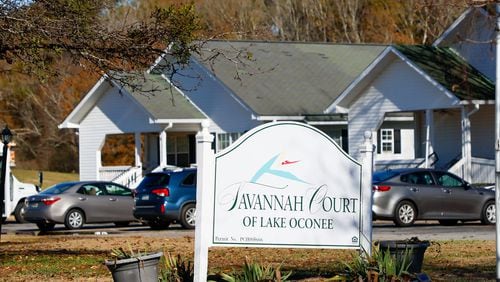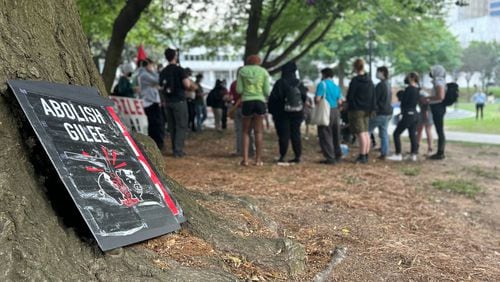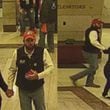Final arguments have officially concluded in an eight-month back and forth over the state’s attempt to close Savannah Court of Lake Oconee, a 72-bed senior care home in Greensboro.
After Georgia’s Department of Community Health submitted a strongly worded brief last month making their case for the facility’s closure, on Friday attorneys for the personal care home submitted a 65-page brief detailing why they believed the facility should be able to keep its state license to operate.
The company argued that state regulators with DCH failed to prove that the home’s alleged rule violations were severe enough for it to be shut down. The attorneys for the home tried to raise doubts about some of the state inspector’s assessments and argued that the state had unfairly marked some rule violations as more severe than they should have been categorized.
The home also submitted testimonials from Savannah Court residents and their families about the hardship they would face if the state shut down the home that has struggled with repeated rule violations.
The closure decision now rests with Administrative Law Judge Charles Beaudrot, who had requested the final arguments to be submitted in writing at the end of a February hearing.
The facility received the closure notice in August after regulators with DCH found seven violations during a pair of inspections on July 31 and Aug. 1. A hearing then commenced on Jan. 3, the same day the AJC published an investigation raising questions about the speed and efficacy of the state’s oversight. Focusing on Savannah Court, the AJC found that the facility received more than 70 state violations since 2021, including the death of two residents in April 2022 and a sexual assault that occurred in October after the state had issued its license revocation notice.
In Savannah Court’s filing last Friday they focused specifically on the July 31 and Aug 1 inspections that led to the revocation notice and did not focus on the facility’s larger history of violations.
When inspectors find violations they code them according to severity, which helps to determine fines. According to Savannah Court’s attorneys Chesley McLeod and Kara Silverman, with Arnall Golden Gregory LLP, DCH retroactively escalated violations to the most severe tag as a revocation notice can only be sent when triggered by such violations.
The company made the argument that some of the violations found in those two inspection reports, such as the facility admitting non-ambulatory residents, did not result in an “imminent and serious threat to the physical or emotional health and safety of one or more persons” as the tag implied.
In their brief last month, the state took a more sweeping approach to what the July 31 and Aug 1 violations suggested about the facility’s commitment to care and state law.
The history of violations, the state argued in their brief, “illustrates that SCOLO has not taken the safety of its citizens and the concerns of this Department seriously and continues to maintain an environment that raises concerns about their ability to provide a safe environment for a vulnerable segment of the population.”
The state also argued in its brief that these violations showed a lack of commitment to previously entered settlement agreements, which had allowed the facility to pay nearly $10,000 in outstanding fines over a protracted period in exchange for certain requirements, like quarterly audits by an independent contractor and a correction plan.
The state had entered into settlement agreements with Savannah Court in July 2021 and March 2023 and pointed to a breakdown of the latter in their revocation argument.
Savannah Court’s attorneys argued in the brief on Friday that the facility had not broken their settlement agreement. They pointed to the hiring of an outside, independent auditor, as was required by the March 2023 agreement, as evidence of their follow-through.
The state in its brief last month, however, made the case that repeated violations, such as admitting non-ambulatory residents, were an example of the settlement agreement being broken.
DCH said they could not comment on Savannah Court’s new filing citing the “pending litigation.”
Now that both parties have submitted their positions the decision is in the hands of Beaudrot.
Typically administrative judges review the record and issue a written decision within 30 days of a hearing.
A party then has 10 days to file a motion for reconsideration.
While the state has been pushing with vigor to close the facility since the AJC investigation was published, they were previously less forceful.
As the original report found, a closure hearing was initially set for Nov. 1, but on Oct. 24 — two weeks after the sexual assault — the parties requested that the court push back the hearing because a third settlement agreement was in the works that would have allowed the home to stay open.
While the state is making a big deal about Savannah Court breaking its settlement agreement, they were open to using such a tool as recently as Jan 3 — the day of the rescheduled hearing.
When an AJC reporter arrived at the Jan. 3 hearing both parties were still discussing a compromise agreement. They ultimately reversed course and a hearing began that afternoon. It was the same day the AJC’s first investigation was published.
“The state’s position is that we’ve made repeated attempts to work with Savannah Court of Lake Oconee, we feel that it’s best at this juncture to move forward with the hearing and allow the court to make the ultimate decision,” Jason Reeves an attorney for DCH said at the time, explaining that he took Savannah Court’s suggestion — a year of independent monitoring — to his higher-ups and was told no.
Reeves would not comment then if AJC’s investigation played a role in the reversal of strategy.






